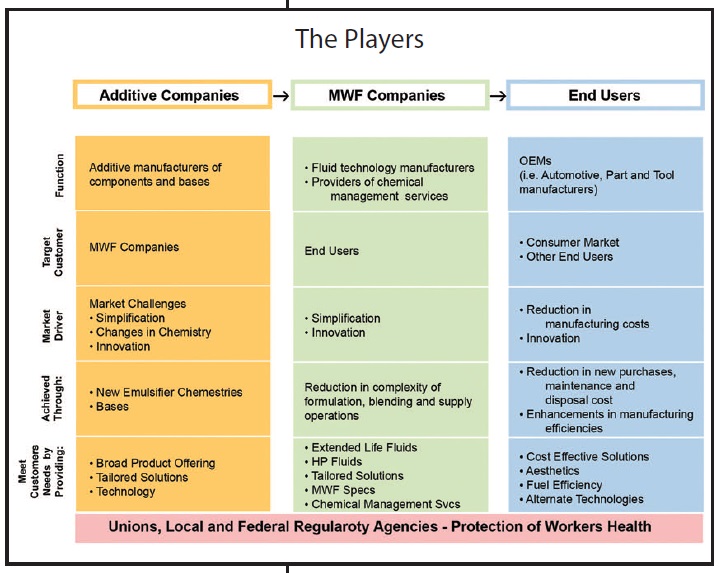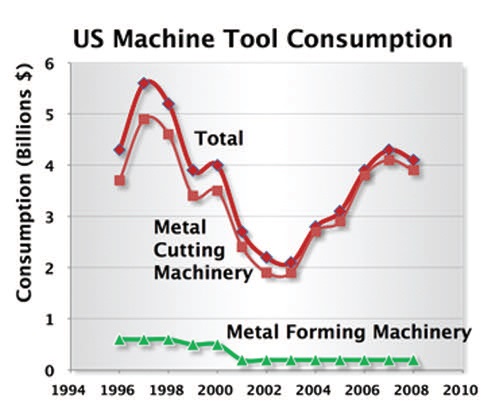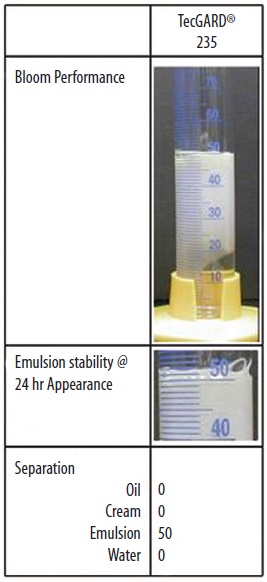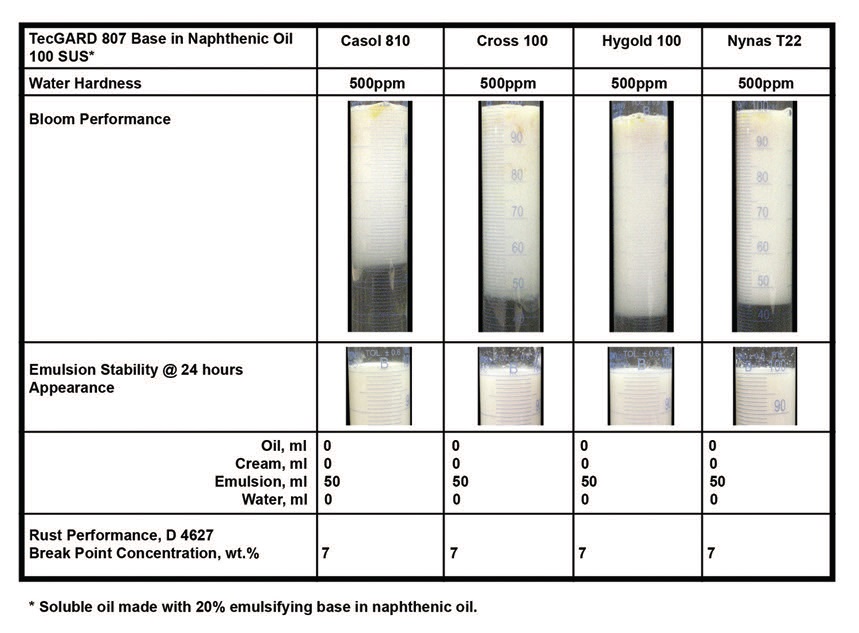Providing Solutions for Current Market Challenges
The metalworking industry plays an essential role in the production of many goods vital to the North American economy. It is rich in its diversity and technical challenges and is driven by several factors. These factors affect individual players in this market in different yet similar ways (
Table 1).
 Table 1.
End Users
Table 1.
End Users
Metalworking end users belong to the metals industry sector of industrial manufacturing. They include companies such as automotive manufacturers, steel mills, metal fabricators, parts makers and machine tool manufacturers. Because of their vigorous impact upon the North American economy, they exert the strongest pull on the value chain. Their target customers are other end users as well as the consumer market.
The recent economic downturn has had a very strong impact upon end users as shown by the graph presenting US machine tool consumption (
1) (
Figure 1). Total consumption is well correlated with leading economic indicators such as Capacity Utilization in Durable Goods Manufacturing, Unemployment, GDP and Housing Starts among others (
2). From 1996 to the present, it rises during strong economic growth and dips in recessionary periods.
 Figure 1. US Machine Tool Consumption (1)
Figure 1. US Machine Tool Consumption (1)
Currently, there are positive signs in the region’s economy. Credit markets are loosening (
3). July presented encouraging indications of future growth in the housing market (
4). The August rise in US manufacturing (
5) spread across the industry and exceeded analysts’ projections (
6). These encouraging trends have led some to predict growth for the US economy in the third quarter of this year (
7). Nevertheless, the economy remains frail (
8), as high unemployment is expected to continue until mid 2010 jeopardizing current efforts aimed at a quick recovery.
In this climate of change, end users look to a variety of options to reduce manufacturing costs. Extended life fluids, reuse and recycle equipment and near dry machining operations offer manufacturers an opportunity to reduce the frequency of maintenance calls and purchases of new fluids as well as to reduce disposal costs. Higher manufacturing speeds, higher number of axis to work the piece, increased accuracy, and automated and maintenance systems that meet the space requirements of existing manufacturing sites increase production efficiency. Innovative technologies that meet the demands of society for greener and more energy efficient products are the engines that will fuel the recovery and create sustainable growth. These efforts allow many OEMs to meet customer needs with cost effective solutions that are environmentally acceptable and, where appropriate, aesthetically pleasing.
Metalworking Fluid Companies
Metalworking fluid companies are comprised of fluid manufacturers and blenders. They pursue a variety of options to reduce costs, such as technical innovation and simplification of their formulation, blending and supply operations. These efforts allow many MWF companies to meet the needs of their end user customers with cost effective solutions, products and services.
Many of the products these companies sell are soluble oils and semi-synthetic fluids. They are oil-in-water emulsions that provide excellent cooling to the tool/piece interface. Together they comprise approximately 65% of the metal removal fluid market in North America (
9). End users utilize large quantities of these emulsifiable oils to increase production efficiency and reduce costs.
Key components in the formulation of soluble oils and semi-synthetic fluids are primary emulsifiers. Natural sodium sulfonates have been the traditional choice to formulate these types of fluids because of their excellent emulsification and rust inhibition performance. Current availability of naturals in North America is, however, limited due to closing of the Shell Martinez plant, the principal supplier of these products to this market.
Metalworking companies have been strongly impacted by the change in supply of a key component in their formulations. They have had to reformulate the majority of their emulsifiable line of oils away from naturals by utilizing alternate chemistries such as synthetic sodium sulfonates, PIBSAs and combinations of the two. These have presented numerous challenges.
Formulation costs have increased as higher concentrations of alternate emulsifiers and additional chemistries are necessary to generate the same emulsification and rust inhibition performance as that achieved with naturals. Some overseas suppliers have brought other variability to the market, such as natural sodium sulfonates of varying quality, security of supply uncertainties or channels to market.
Additive Companies
Additive companies are driven to meet current market challenges for technology, innovation and simplification with a variety of options. Companies with regional manufacturing facilities who offer innovative products provide advantages to metalworking fluid companies seeking security of supply, improved performance, differentiation and reduction in formulation complexity. For example, companies who supply synthetic sodium sulfonates consisting of branched chains and with broad molecular weights, such as Afton Chemical’s TecGARD® 260A Synthetic Sodium Sulfonate, offer primary emulsifiers with excellent emulsification and rust inhibition performance.
Metalworking fluid companies find PIBSAs add value to their formulations. These primary emulsifiers offset higher formulation complexity and costs resulting from supplemental additives used to achieve desired rust performance in their fluids. When utilized in the presence of select chemistries, PIBSAs can impart extended life, bio-resistance characteristics to metalworking coolants. This formulation approach can reduce biocide use as well as frequency of maintenance calls and new fluid purchases to end users.
Un-neutralized PIBSAs, such as Afton Chemical’s TecGARD® 235 PIBSA, provide metalworking fluid companies the opportunity to build differentiation into their formulations (
Figure 2). Basic chemistries, such as amines, are reacted in these formulations with PIBSAs to facilitate emulsification and impart stability to the resulting emulsion. Currently, formulators have a number of toxicologically and environmentally acceptable basic chemistries available in the market from which to choose.
 Figure 2. Emulsification Performance of TecGARD® 235 Un-neutralized PIBSA in a Soluble Oil Concentrate.
Figure 2. Emulsification Performance of TecGARD® 235 Un-neutralized PIBSA in a Soluble Oil Concentrate.
Additive companies with broad product lines support MWF manufacturers’ efforts to simplify their supply and blending operations. These portfolios typically offer extended product offerings consisting of industrial packages and components as well as metalworking fluid additives and emulsifying bases that service the needs of fluids utilized in the metals industry.
Bases not only simplify formulation, blending and supply operations for fluid manufacturers who wish to reduce their technical development and inventory costs, but they provide these metalworking companies formulation agility as well. They perform robustly in a variety of base stocks available in the North American market with waters of varying hardness and can be utilized as core packages to build a formulation to meet a more challenging target performance (
Figure 3).
 Figure 3. Emulsification and Rust Inhibition Performance of TecGARD® 807 Base.
Common Thread
Figure 3. Emulsification and Rust Inhibition Performance of TecGARD® 807 Base.
Common Thread
While market factors affect each player in a different fashion or not all, the strong focus by union and regulatory agencies on protection of worker’s health impacts the entire market value chain. This includes the elimination of carcinogenic or high toxicity formulations as well as mist control. Additive companies, metalworking companies and end users must provide and utilize solutions to meet market challenges that are acceptable from a health, safety and environmental perspective.
How is Afton Chemical Continuing to Help Formulators Meet These Market Challenges?
With our recent inclusion of an emulsifying base offering in the portfolio, Afton Chemical deepens its commitment to provide solutions to the challenges faced by this market.
The TecGARD® line of metals-industry additives is very broad so we continue to tailor products to meet the needs of the industry with our Passion for solutions."
References
1.
American Machine Tool Distributors Association, click
here, April 13, 2009
2.
Tool Trends (Winter 2009), AMTDA, 7361 Calhoun Place, Suite 320, Rockville,MD 20855
3.
Yahoo! Finance, click
here, September 10, 2009
4.
Yahoo! Finance, click
here, September 1, 2009
5.
Yahoo! Finance, click
here, September 1, 2009
6.
The Washington Post, click
here, September 17, 2009
7.
Yahoo! Finance, click
here, September 15, 2009
8.
Yahoo! Finance, click
here, September 17, 2009
9.
Lubricant Additives NA, 2002 – 2007 – Kline & Co., 2002.